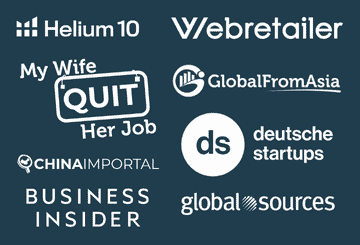To say Shopify has grown into an e-commerce juggernaut since 2012 would be an understatement:
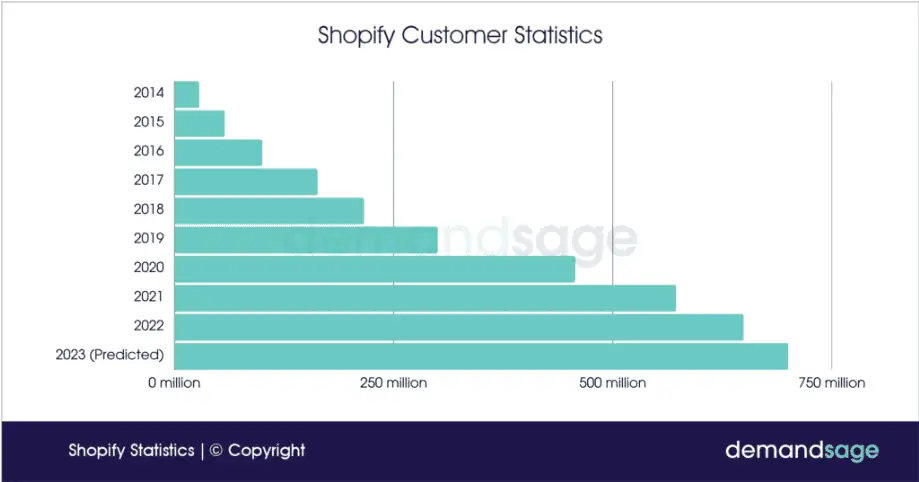
It’s also fair to say that apps for the platform have never been more popular:
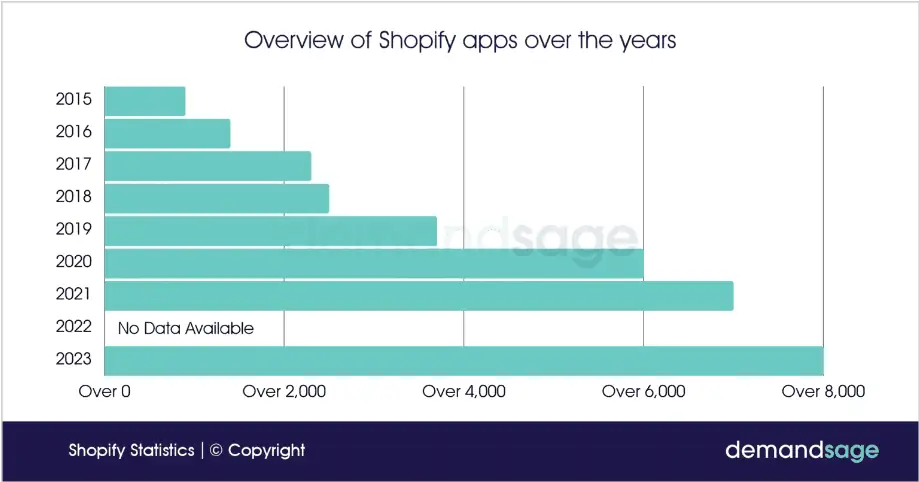
Did you know that upselling can significantly boost your average order value (AOV) without a massive marketing push?
Customers on your site are already intrigued by your brand and offerings.
The challenge?
Presenting them with the right product upgrades at the optimal moment. When executed correctly, upselling can not only enhance your revenue but also solidify customer relationships.
On the flip side, a poorly timed or irrelevant upsell might come off as pushy, akin to an overzealous salesperson.
The Power of Upselling
Upselling isn’t about pushing any product to a customer; it’s about offering a more premium or upgraded version of what they’re already interested in.

The beauty of this strategy lies in its focus on existing customers. Selling to them has a success rate of 60%–70%, far higher than the 5%–20% likelihood of selling to a new shopper.
Moreover, the probability of a repeat purchase from first-time buyers is 27%, but after their second or third buy, this jumps to 54%.
By strategically placing upsells throughout the customer journey, you can witness a surge in order sizes.
The right app can seamlessly integrate these upsell strategies, ensuring that your upselling efforts feel organic and genuinely beneficial to the customer.
I’m going to look at 7 of these apps in depth to see which one helps you best and – ultimately – will increase your Shopify income.
Let’s dive in:
Best Shopify Upsell Apps
Let’s explore some of the top contenders:
1. Best Overall: One Click Upsell by Zipify

After thorough research of several Shopify upsell apps, I’ve found the cream of the crop.
One Click Upsell by Zipify stands out as the top contender, and here’s why:
Features:
- Customization: One of the app’s most significant selling points is its ability to create custom upsell and down-sell offer pages. This ensures that customers see offers tailored to their interests after adding a product to their cart.
- Post-Purchase Upsells: After completing a purchase, additional offers are presented, a strategy aimed at optimizing sales potential.

- Split Testing: If there’s uncertainty about which offers might connect more with customers, the split testing feature comes in handy, allowing a comparison of different offers.
- Integration: It integrates smoothly with platforms like Stripe and PayPal, ensuring a streamlined transaction process.
- Performance Metrics: With over $1.5 billion in processed orders, the app’s effectiveness is evident.
- Data Insights: The dashboard provides insights into top-performing products and average order values. The app’s metrics indicate a 16.2% average conversion rate, and users typically experience a 10-15% uplift in sales after installation.

- Mobile Experience: The app is optimized for various devices, ensuring a uniform shopping experience.
- Shop Integration: It’s noteworthy that there’s an exclusive integration with Shopify’s mobile app – “Shop” – for post-purchase upsells.
- Support: For any assistance, an in-app chat feature is available.
Pricing:

- Tier 1: $35/month + 1% of upsell revenue for up to $1k in upsell revenue.
- Tier 2: $95/month + 1% of upsell revenue for upsell revenue between $1k-$10k.
- Tier 3: $195/month + 1% of upsell revenue for upsell revenue above $10k.
All tiers come with a 30-day free trial, allowing you to test the waters before committing.
Pros:
- User-Friendly: Merchants on the app’s Shopify page have praised the app for its user-friendliness and smooth integration with Shopify.
- Immediate Sales Growth: Many users have reported an instant 10-15% increase in sales after integrating Zipify into their Shopify stores.
- Support: The customer support team has been lauded for their promptness and expertise.
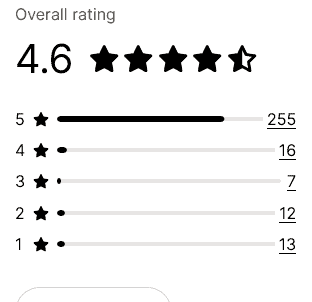
Cons:
- Performance Issues: One user reported that after installing OneClickUpsell, their “Add To Cart” and “Buy It Now” buttons took over 10 seconds to load.
- Checkout Pop-up Issues: Another user highlighted that the app’s checkout pop-up was blocked by Chrome on iOS, rendering it ineffective.
What makes it stand out from the rest
No other app in this roundup increased my AOV as much as this one. My average order value jumped up about 14% almost immediately.
In my experience, One Click Upsell by Zipify is my first choice for Shopify store owners.
Its features are designed to boost sales, and the positive reviews from other merchants are a testament to its effectiveness.
2. Runner up: Rebuy Engine

It was a tight race, but Rebuy Engine emerged as our close second.
Features:
- Smart Cart:: Rebuy’s standout feature, the Smart Cart technology, acts as a shopping cart replacement for Shopify. It enhances the shopping experience by making checkouts quicker, displays special discounts during checkout, and uses visual prompts to encourage larger purchases.
- Post-purchase Offers: Rebuy presents one-click post-purchase offers on the checkout page. These offers can be triggered based on products purchased, cart value, and more.
- Intelligent Personalization: Using historical shopping data, Rebuy creates a hyper-personalized shopping experience for every customer.
- Automated Retention: Rebuy offers tools for automated retention and repeat sales activities, including one-click subscription reactivation and post-purchase follow-up emails.
- Marketing Links: Shareable links drive customers to pre-populated carts with auto-applied discounts, boosting conversions.
- Shopify Script Editor: Exclusive for Shopify Plus merchants, this feature allows the creation of dynamic checkout upsells.
Pricing:
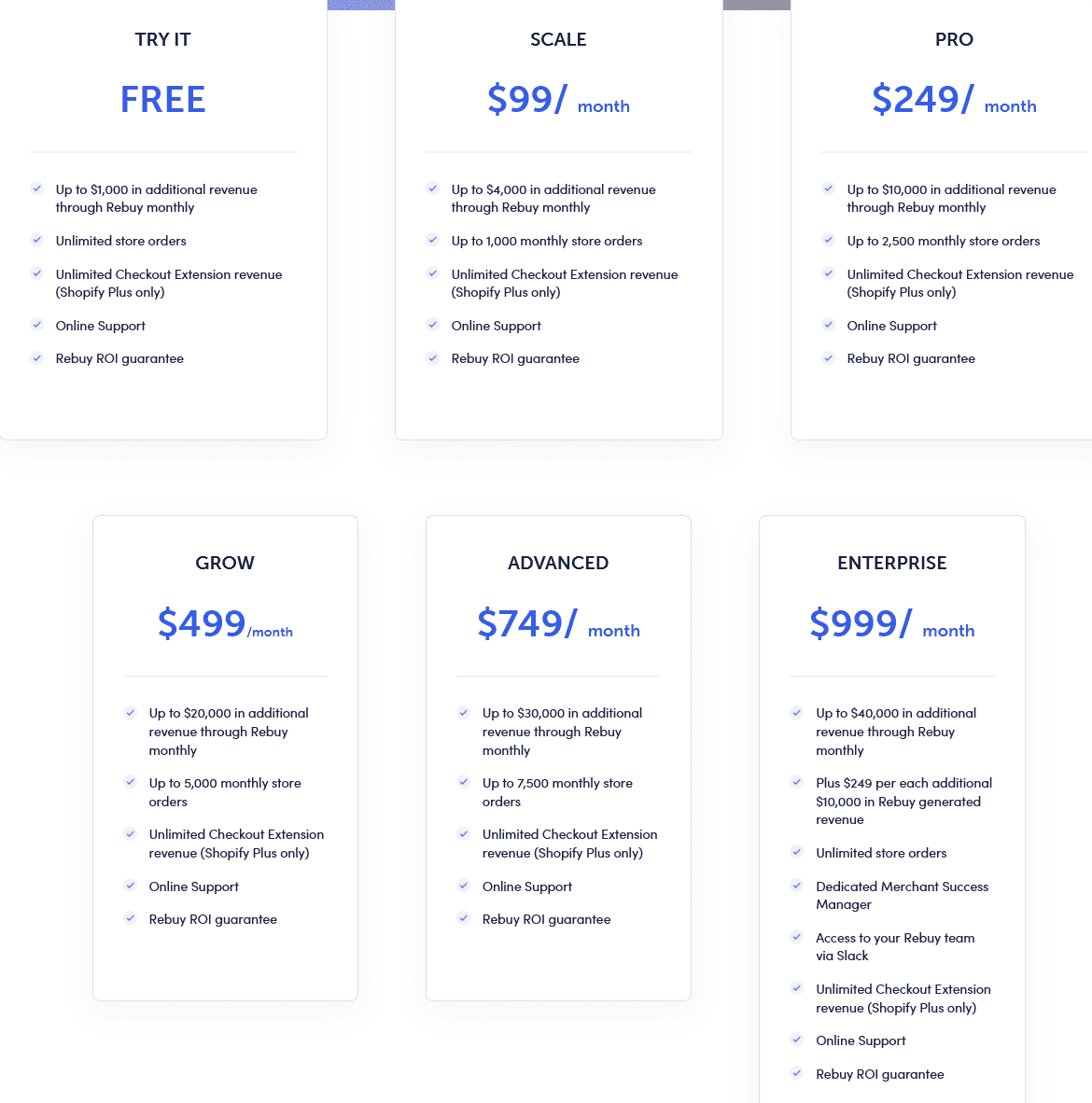
- Starter Plan: $99/month for up to 1,000 orders/month.
- Scale Plan: $249/month for up to 2,500 orders/month.
- Pro Plan: $499/month for up to 5,000 orders/month.
- Grow Plan: $749/month for up to 7,500 orders/month.
- Enterprise Plan: $999/month for unlimited orders.
Like Zipify, you can also take it for a free test drive with limited features.
Pros:
- AI-Driven Smart Cart: Users have loved Rebuy’s AI-driven smart cart feature – and I have to agree with them here, it’s the platform’s secret sauce.
This tool intelligently suggests products, enhancing the shopping experience and boosting the Average Order Value (AOV).
- User-Friendly Interface: The platform is praised for its intuitive design, allowing even those without a tech background to navigate and utilize its features effectively.
- Customizable Features: Rebuy offers a range of customizable features, allowing businesses to tailor the app to their specific needs and preferences.
The app’s almost universal praise from users only reinforces the above points – Rebuy Engine is a very popular choice:
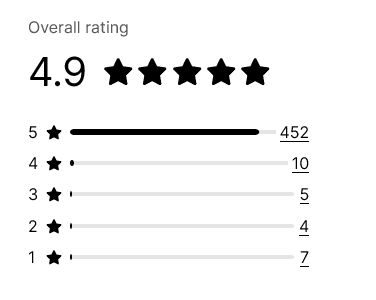
Cons:
- Complex Functionalities: Some users have found certain features of the app to be complex and time-consuming to fully understand and implement.
- Support Team Availability: There have been concerns about the support team’s availability, especially for merchants operating outside the Pacific Standard Time (PST) zone. This can lead to delays in resolving issues.
What makes them stand out from the rest
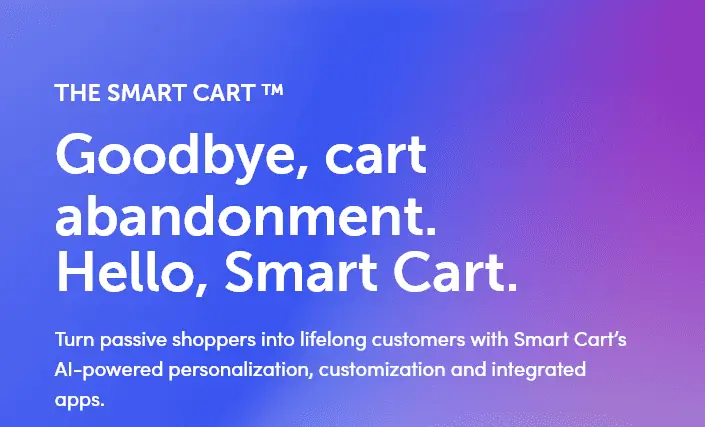
- This company’s Smart Cart feature seems to be embracing and incorporating AI much better than its rivals.
- Their ROI Guarantee is also quite unique in this industry.
Rebuy guarantees that all clients using their services will experience a beneficial ROI. This is determined by comparing the expenditure on the Rebuy platform to the subsequent revenue it generates.
3. ReConvert

While OCU by Zipify and Rebuy Engine stood out in their own right, other apps like ReConvert have unique offerings that shouldn’t be overlooked.
Features:
- Thank-You Pages: ReConvert allows users to design personalized thank-you pages post-purchase. It’s a neat feature, especially since it doesn’t interfere with Shopify’s standard checkout.
- Upsell & Cross-sell Tactics: The app provides tools such as timer pop-ups and reorder widgets.
- Smart Triggers: This feature adjusts thank-you pages based on various factors like the product purchased or customer data. It’s a thoughtful touch for those looking to offer more personalized experiences.
- Data Collection: ReConvert offers a way to gather feedback and other customer insights. The birthday collection is a unique touch, potentially useful for future marketing campaigns.
- Integrations: The app can be integrated with other tools to enhance product suggestions or automate certain campaigns. It’s a plus for those who rely heavily on app ecosystems.
- Real-time Analytics: A straightforward dashboard provides insights into sales and overall store performance
Pros:
- Sales Boost: Many users reported a noticeable rise in sales.
- Ease of Use: The setup process is straightforward, thanks to its user-friendly design.
- Support: Users frequently commend the support team for their timely and effective assistance.
- Widget Variety: A vast library of widget choices.
- Live Chat: I personally got a very prompt live answer to a pricing query on their home page. The answers to follow up questions were too nuanced to be AI. This is definitely a plus as too often AI chat bots aren’t enough.

- Ready-to-Use Templates: Free templates to kickstart your design.
- One-Click Upsells: Simplifying the upselling process.
- Detailed Analytics: Comprehensive dashboard to monitor sales and store health
Overall, this app is loved by Shopify store owners with an almost perfect score on the app page:
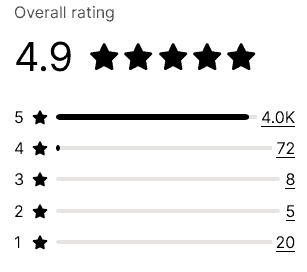
Cons:
- Order Limitations: Some users found the monthly order limits restrictive.
- Unclear pricing: I had to make a query with their live chat support to discover their pricing tiers.
What makes it stand out from the rest
Some stores will use the app solely for the strong non-converting features, like birthday collector, order tracking and surveys.Their case studies page has plenty of success stories of companies doing just that.
A company called Tushy, for example, used the Thank You page feature to generate a serious amount of extra revenue:
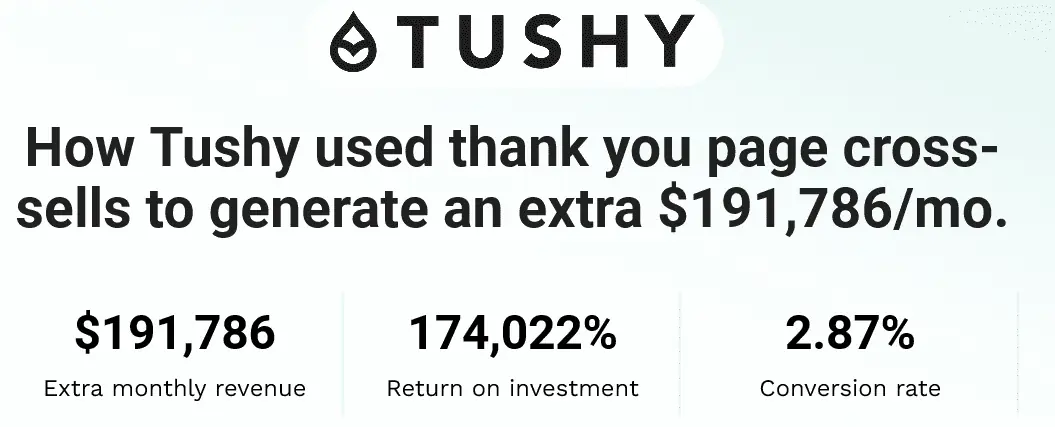
4. Frequently Bought Together

Next on our roundup is the “Frequently Bought Together” app for Shopify. Let’s look at its offerings:
Features:
- Data-Driven Recommendations: The app boasts an AI trained with over 1 billion orders and 90 million products, ensuring its product suggestions are not just random but based on actual buying patterns.
- Merchant Control: While AI does its job, merchants have the final say. They can adjust and customize the product combinations as they see fit.
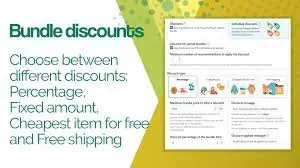
- Varied Discounting: The app offers four distinct discount types, catering to different marketing strategies.
- Theme Flexibility: It’s designed to integrate smoothly with a variety of Shopify themes, ensuring consistent user experience.
- Mobile Friendly: You can tweak FBT on the go
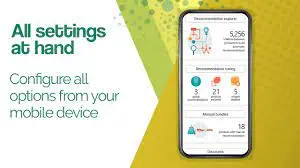
Pricing:
At a monthly rate of $9.99, merchants can:
- Access all features without restrictions
- Manage unlimited products, orders, and traffic
- Avail a 30-day free trial
Pros:
- High Traffic Management: The app is adept at handling significant traffic and vast product catalogs.
- Order Value Boost: Post-installation, many users reported an increase in average order values.
- Stellar Support: Luisa, from their support team, was p\articularily helpful for her timely and effective assistance.
- Effortless Setup: The majority found the setup process straightforward, with most up and running in under 10 minutes.
- Balanced Control: A harmonious blend of AI-driven suggestions and manual adjustments provides a unique approach.
Overall, the reviews on the Shopify app page are almost a perfect 5 stars:
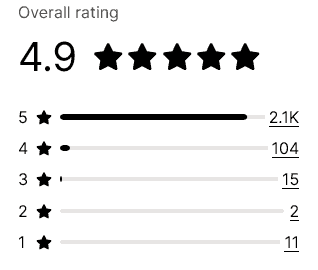
Cons:
- Theme Compatibility: Some users faced initial theme compatibility hitches, although these were quickly addressed.
- Checkout Recommendations: A segment of users expressed a desire for product recommendations to be present during the checkout process.
What makes it stand out from the rest
The app’s ability to offer “Frequently Bought Together” discounts on the second item when two products are purchased from the recommendation section is a unique touch, incentivizing customers to purchase more.
5. Honeycomb Upsell and Cross Sell

Next on my review radar is an app that optimizes the Shopify experience with strategic upselling and cross-selling.
Features:
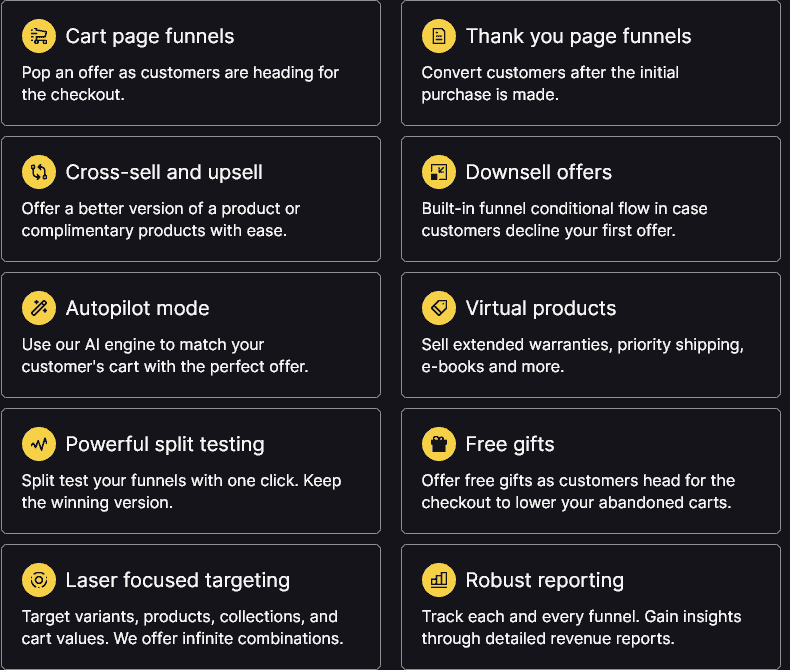
- Strategic Upsell Funnels: Honeycomb strategically places upsells on product, cart, and thank you pages, aiming to maximize sales opportunities.
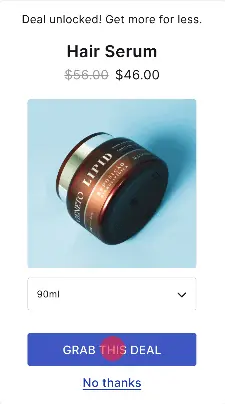
- In-Checkout Funnels: For Plus users, Honeycomb offers in-checkout funnels, allowing customers to see offers as they’re about to check out, potentially increasing cart value.
- A/B Testing: This feature lets businesses test different offers to see which one resonates more with their customers.
- One-Click Post-Purchase: After the initial payment, Honeycomb shows an upsell offer. The beauty is that customers can accept this without having to re-enter payment details.
- Customization: The app allows for design flexibility, ensuring that the upsell funnels match the store’s aesthetic.
Pricing:
- FREE: Product & Cart upsells 100 views/month.
- SILVER ($49.99/month): Product & Cart upsells + Remove branding; 2,000 views/month.
- GOLD ($99.99/month): Product & Cart upsells + Remove branding; + 5,000 views/month.
- PLATINUM ($149.99/month): Product & Cart upsells + Remove branding; + 10,000 views/month.
Pros:
- Quick Results: One user mentioned making over $200 in sales shortly after installing the app.
- Increased Revenue: Another user credited the app for generating over $40,000 in extra revenue.
- Ease of Use: Users have praised the app’s simplicity and efficiency.
- Supportive Customer Service: Several users highlighted the prompt and helpful responses from the support team.
Cons
- Integration Issues: The app reportedly doesn’t work well with its partner app, Bundle Bear, especially when using bundle discounts.
- Installation Problems: Some users faced errors during the app’s installation process.
Overall though, the reviews on the Shopify app page are steller:
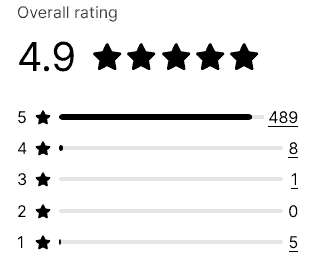
What makes it stand out from the rest:
The app offers discounts for higher spending and provides personalized product cross-selling.
6. InCart Upsell

Next in our roundup, I’m checking a tool designed to enhance the shopping experience by presenting upsell and cross-sell offers directly within the cart drawer and full cart page.
Features:
- AI Recommendations: The app suggests upsell products that shoppers are likely to purchase.
- Customer Segmentation: Offers can be shown or hidden based on customer tags.
- Discount Capabilities: Users can set up discounts or BOGO offers that integrate with Shopify.
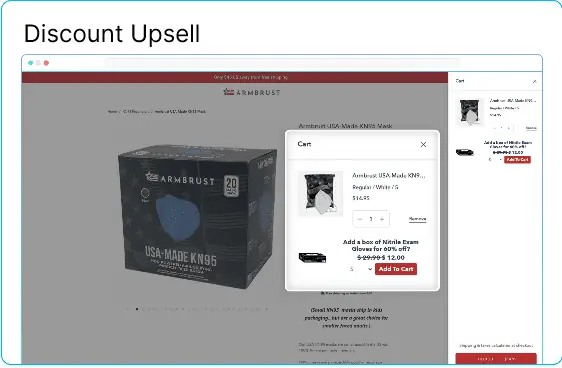
- Targeting Flexibility: Offers can be targeted based on location, cart content, or order amount.
- Performance Testing: Built-in A/B testing allows users to compare two versions of an offer and automatically promote the more successful one.
- Bundle Options: You can offer your customers a straightforward bundle offer or a quantity bundle discount offer:
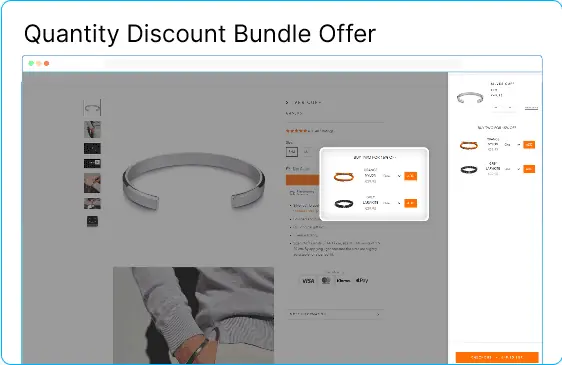
- One-Click Upsells: Boosts average order value by presenting complementary products or time-sensitive deals.
Pricing:
All tiers are based on what Shopify plan you’re using. There’s also a free tier and a 30 day no risk free trial for any plan too:

- Free Plan:
- Cost: Free
- Features: 1 upsell/cross-sell offer; includes “Powered By In Cart Upsell” watermark.
- Shopify Basic ($19.99/month):
- Offers: Limit of 500 upsell/cross-sell offers.
- Features: Geo-targeting; Autopilot for AI-generated offers; A/B testing; advanced discount terms; live onboarding setup.
- Shopify Standard ($29.99/month):
- Offers: Limit of 500 upsell/cross-sell offers.
- Features: Geo-targeting; Autopilot for AI-generated offers; A/B testing; advanced discount terms; live onboarding setup.
- Shopify Advanced ($59.99/month):
- Offers: Limit of 500 upsell/cross-sell offers.
- Features: Geo-targeting; Autopilot for AI-generated offers; A/B testing; advanced discount terms; live onboarding setup.
Pros:
- Effective Results: One user reported a 25-30% uptake on upsell offers, leading to easy additional revenue.
- Conversion Boost: Another merchant mentioned tripling their conversion rate with the app.
- User-Friendly: Many users praised its ease of setup and offer management.
- Responsive Support: The support team has been highlighted almost universally for their quick and efficient assistance.
Overall, it has high praise on the Shopify app page:
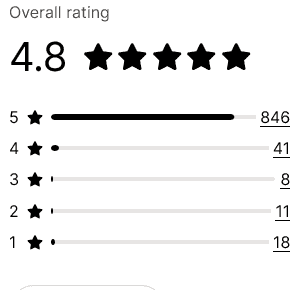
Cons:
- Complexity: Some users found creating offers to be time-consuming with basic options.
- Compatibility Issues: The AI system might not work well with manual offers, and there have been issues with Shopify translations and certain themes.
What makes it stand out from the rest:
The app’s standout feature is its ability to optimize the Shopify experience by presenting upsell and cross-sell offers directly within the cart, enhancing the likelihood of additional purchases without navigating away from the cart.
7. Zoorix

Zoorix, originating from Sri Lanka, boasts a flawless 5-star rating on Shopify, indicating its popularity and effectiveness.
Let’s take a look:
Features:
- Setup Experience: I was able to get Zoorix running in about 2 minutes, which was quite impressive. No coding was needed, which is a relief for those not technically inclined.
- Product Recommendations: The app has a built-in slider that suggests products often paired together. You can either set this up yourself or let Zoorix’s AI do the work.
- Bundling Offers: Zoorix encourages bulk purchases by offering discounts for bundled items.
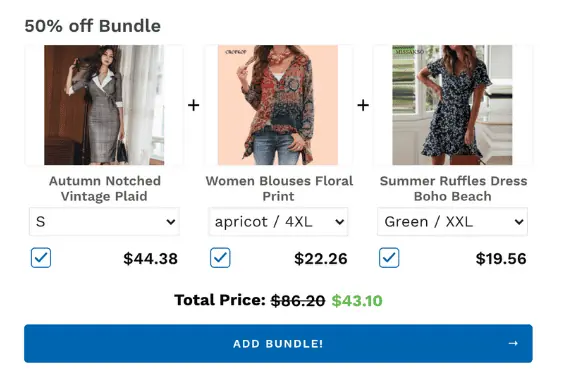
- Volume Discounts: If you’re looking to buy in bulk, Zoorix offers discounts that increase with the quantity.
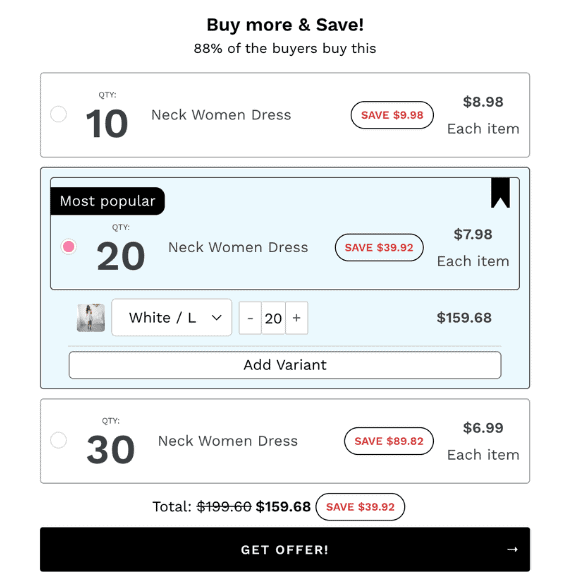
- Mini-Cart Insights: The cart drawer is designed to suggest complementary products, potentially enhancing the shopping experience.
- Mix & Match Discounts: This feature rewards shoppers for buying items from different collections, offering unique discounts.
- Mobile Responsiveness: The app adjusts well to different devices, ensuring a consistent shopping experience.
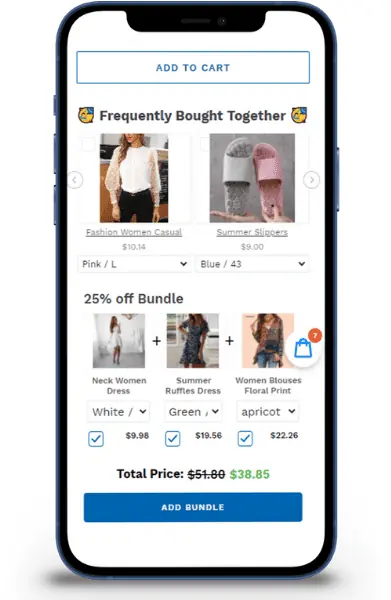
- Unlimited Creation: There’s no limit to the number of bundles or sliders you can set up, giving you ample flexibility.
Pricing:
- Free Plan: Suitable for those just starting out, this plan supports up to 50 orders per month and offers basic upsell features. Notably, it’s free until Zoorix generates an additional $100 in revenue for you.
- Starter Plan ($14.95/month): A step up from the free version, this plan introduces more advanced upselling options.
- Growth Plan ($29.95/month): Designed for growing businesses, it offers an extended range of features, including more sophisticated upsell offers.
- Pro Plan ($79.95/month): The premium choice for those who want the full suite, including advanced analytics and the most comprehensive set of upselling tools.
Pros:
- Easy Setup: Users highlight the simplicity of getting started.
- AI Recommendations: The app’s AI-driven product suggestions stand out.
- Mobile Experience: Users appreciate the smooth mobile interface.
- Customization Options: The app’s adaptability, from volume discounts to upsell sliders, is notable as well.
Overall, although my personal experiences with OCU and Rebuy Engine were better – there’s no denying the popularity of Zoorix on the Shopify app store:
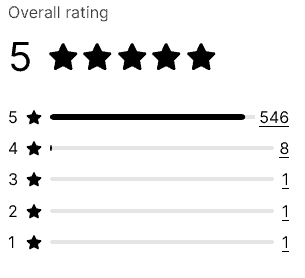
Cons:
- Technical Glitches: Some users reported issues with the app interfering with other functionalities on their site.
- App Confliction: One review noted it doesn’t play nice with the Bold Upsell app when both are installed.
What makes it stand out from the rest:
Zoorix’s free version is excellent. While it’s limited to 50 orders per month, the inclusion of premium features in this tier is a rarity, making it a standout in our roundup.
It’s great for a brand new Shopify store with very little budget.
Wrapping Up
Shopify’s dominance in e-commerce is undeniable, and the right upselling app can supercharge your store’s revenue.
The standout in our review, One Click Upsell by Zipify, offers a blend of features that best cater to this need.
For more Shopify insights, check out these articles.
And are you considering a new Shopify venture? The Shopify Due Diligence Service is your go-to for a thorough assessment.
Boosting your Shopify store’s potential has never been more accessible; make the most of these tools and watch your revenue soar.
FAQ
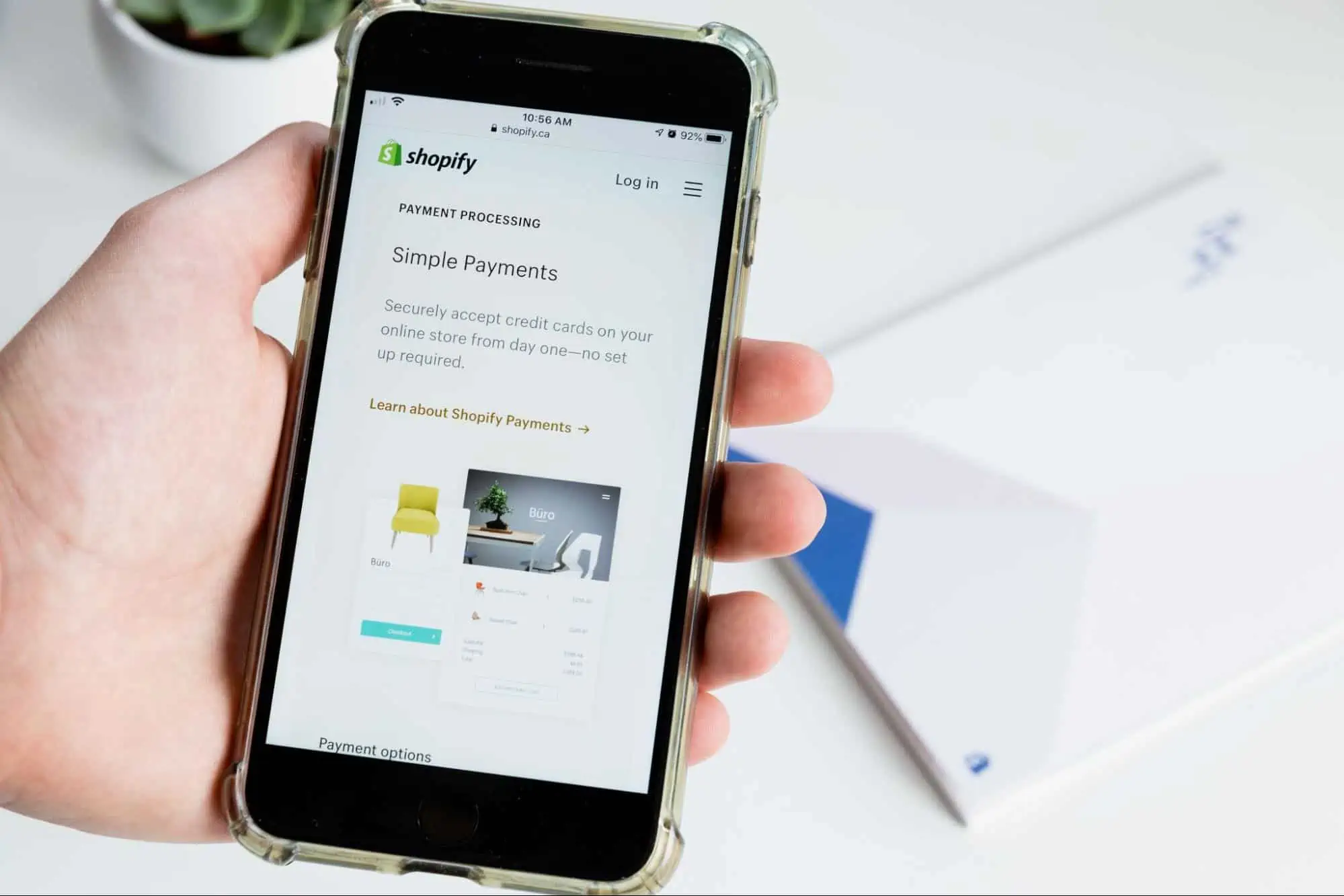
Does Shopify allow upselling?
Yes, Shopify allows upselling.
The platform supports various apps designed to enhance upselling strategies, enabling merchants to present customers with premium or complementary products.
By leveraging these apps, store owners can effectively increase their average order value—making the most of each customer interaction.
Utilizing upselling on Shopify can significantly boost revenue and solidify customer relationships.
Upselling vs. cross-selling, or both?
Both.
Upselling in Shopify focuses on encouraging customers to purchase a higher-end product than the one in consideration.
It’s about enhancing the product’s value—like suggesting a more advanced camera when a customer is viewing a basic model.
Cross-selling, on the other hand, aims to sell complementary products to the one being purchased.
Think of recommending a camera case or lens when someone buys a camera.
Both strategies have their merits on Shopify. While upselling can increase the transaction’s value, cross-selling can enhance the customer’s overall experience.
Ideally, using a combination of both can maximize revenue and customer satisfaction.
What are the 4 stages of upselling? (with examples for a Shopify store)
1. Facilitate the Original Purchase
Ensure the customer’s primary shopping experience is simple and straightforward.
For instance, if a customer buys a pair of running shoes from your Shopify store, make sure they have an easy time selecting their size, color, and checking out.
2. Introduce the Add-On
After they’ve added the running shoes to their cart, suggest complementary items.
This could be performance socks or a shoe cleaning kit. These suggestions should feel like a natural extension of their original purchase.
3. Explain the Benefits
Emphasize why the add-on is beneficial. For the performance socks, highlight their moisture-wicking properties and how they can enhance the comfort of the running shoes.
For the shoe cleaning kit, explain how it can extend the lifespan of the shoes and keep them looking new.
4. Close the Deal
Once the customer sees the value in the add-on, make the purchase process straightforward.
Perhaps offer a bundle discount if they buy the shoes and socks together, or provide a short video tutorial on how to use the cleaning kit effectively with their new shoes.
Remember, the key is to ensure the add-on brings genuine value to the customer, enhancing their original purchase.
How to upsell without turning off customers?
Upselling, when done right, can be a win-win for both the business and the customer. Here’s how to upsell without turning off your Shopify customers:
1. Relevance is Key:
Ensure your upsell aligns with the customer’s needs. For instance, if a customer buys a skincare product, suggesting a complementary moisturizer makes sense.
2. Transparency Matters:
Always be clear about the benefits of the upsell. If a customer buys a basic skincare product, explain how the premium version has added ingredients that provide faster results.
3. Timely Recommendations:
Offer upsells at the right moment. If a customer is browsing winter clothing, suggesting thermal wear is timely and relevant.
4. Avoid Over-Pushing:
No one likes feeling pressured. Offer upsells as suggestions, not necessities. If a customer declines, respect their decision.
5. Ensure Availability:
If you’re suggesting an upsell, ensure the product is in stock. It’s frustrating for customers to want something and then find out it’s unavailable.
6. Use Data Wisely:
Personalize upsells based on customer behavior. If they frequently buy workout gear, suggesting a new arrival in activewear can be enticing.
7. Value-Add is Crucial:
Always show how the upsell adds value. For instance, if a customer is buying electronics, explain how an extended warranty can save costs in the long run.
In a nutshell:
Upselling should feel like a natural extension of their purchase journey, not a forced sales tactic.

